Kaiser Health Tracking Poll – June 2018: Campaigns, Pre-Existing Conditions, and Prescription Drug Ads
Findings
Key Findings:
- Health care continues to be one of the top issues that voters want to hear candidates talk about during their 2018 congressional campaigns. One-fourth of voters say health care is the “most important issue” for 2018 candidates to discuss during their campaigns, which is similar to the share who say the same about the economy and jobs (23 percent). While health care is a top issue for Democratic and independent voters, it remains a second tier issue for Republican voters.
- Few voters (about one in ten) say a candidate’s support for a variety of different health care positions will be the “single most important factor” in their 2018 vote choice. But among the health care issues provided, majorities of Democratic voters, independent voters, and Republican voters say a candidate’s support for continued protections for people with pre-existing health conditions is either the “single most important factor” or “very important, but not the most important factor” to their vote.
- In light of a recent federal lawsuit and subsequent decision by the Trump administration, this month’s tracking poll finds most of the public – including majorities of Republicans, Democrats, and independents – say it is “very important” to them that the ACA’s provisions protecting those with pre-existing conditions remain law. Three-fourths say it is “very important” that the ACA provision prohibiting insurance companies from denying coverage due to someone’s medical history remains law, and seven in ten say the same about the ACA provision prohibiting insurance companies from charging sick people more. Nearly six in ten Americans say they live in a household where someone has a pre-existing medical condition.
- A majority of the public – including eight in ten Democrats – support President Trump’s plan to require drug manufacturers to publish list prices for their prescription drugs in television advertisements.
- While most have seen or heard advertisements for prescription drugs, about one in seven say they have talked to their doctor as a result of seeing an advertisement for a prescription drug. Yet, among the fourteen percent of the public who have talked to their doctor about a drug they saw advertised – more than half (55 percent, 11 percent of adults) say they were prescribed the drug they asked about and half (48 percent, 10 percent of adults) discussed the price of the drug with their doctor.
Top Issues for 2018 Congressional Campaigns
Health care ranks as the top issue for Democratic and independent voters; the economy and jobs top the list for Republicans
Health care continues to be one of the top issues that voters want to hear candidates talk about during their 2018 congressional campaigns. One-fourth of voters say health care is the “most important issue” for 2018 candidates to discuss during their campaigns, which is similar to the share who say the same about the economy and jobs (23 percent). Slightly fewer say gun policy (20 percent), immigration (18 percent)1 , and foreign policy (13 percent) are the most important issues for 2018 candidates to talk about during their campaigns.
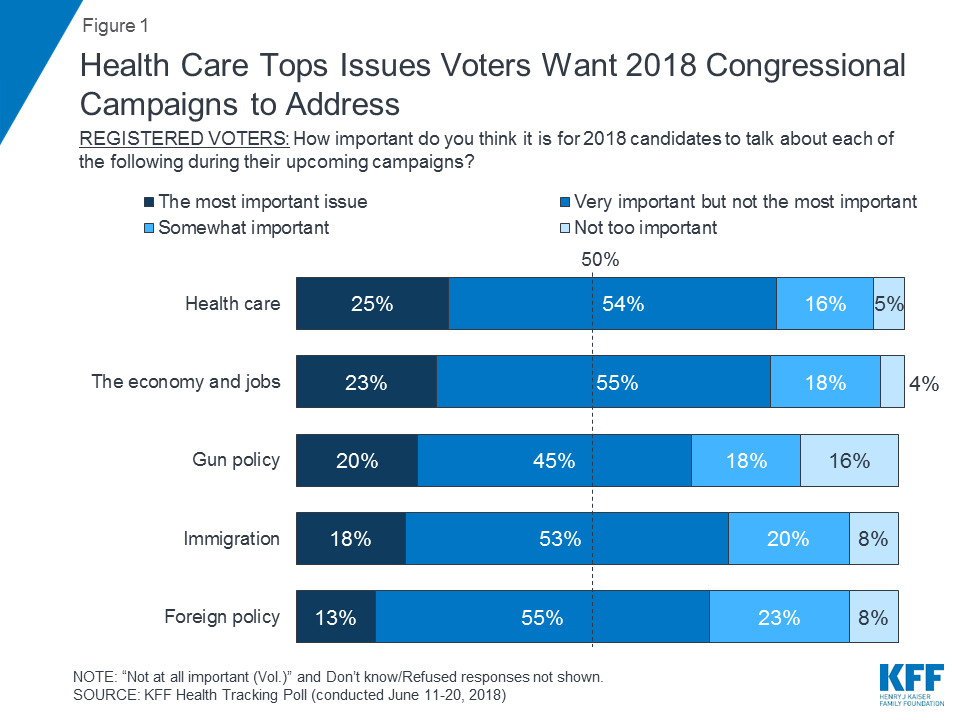
Health Care and Republican Voters
While health care is a top issue for Democratic and independent voters, it remains a second tier issue for Republican voters. One-fourth (27 percent) of Republican voters say the economy and jobs is the most important issue for candidates to talk about during their campaigns, followed by immigration (19 percent), and health care (18 percent). However, the share of Republican voters who say health care is the most important issue has risen slightly since January 2018 when one in ten (13 percent) Republican voters said it was the most important issue.
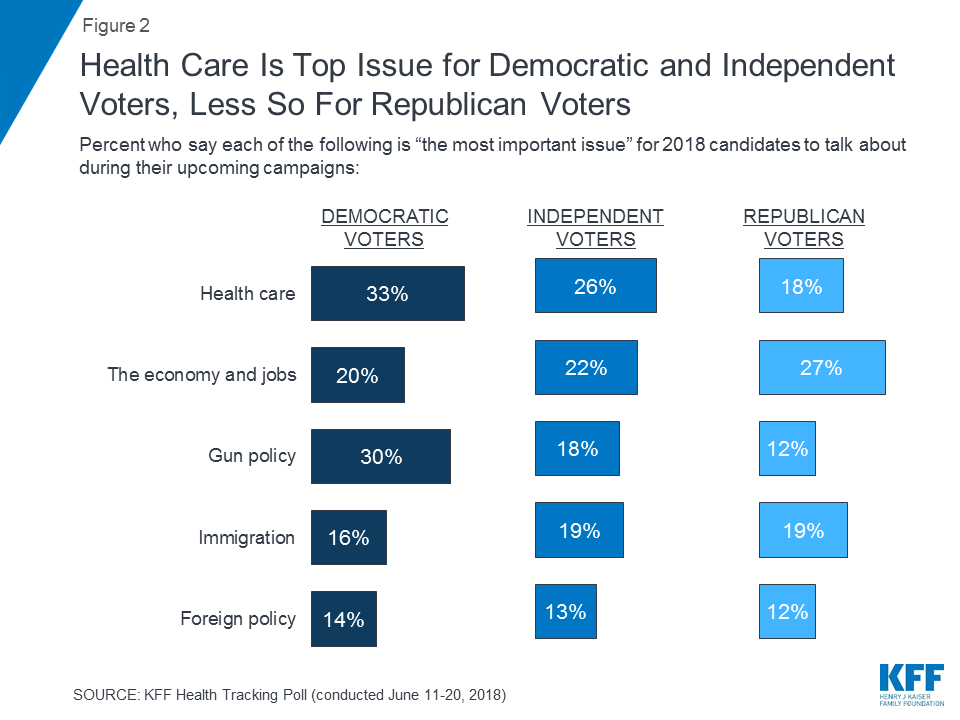
Which Health Care Issues Matter Most to Voters?
NEW: More voters say a candidate’s stance on protecting pre-existing conditions is important to their vote than say the same about drug prices, ACA repeal and other health care issues
Few voters (about one in ten) say a candidate’s support for a variety of different health care positions will be the “single most important factor” in their 2018 vote choice, but about two-thirds say a candidate’s support for continued protections for people with pre-existing health conditions is either the “single most important factor” or “very important, but not the most important factor.” Fewer – but still a majority – say a candidate’s support for passing legislation to bring down prescription drug costs (58 percent), support for repealing the Affordable Care Act (ACA) (53 percent), or passing legislation to stabilize the ACA marketplaces (52 percent) is either the single most important or a very important factor. Half (48 percent) say a candidate’s support for passing a national health plan, or Medicare-for-all is very or most important to their 2018 vote choice.
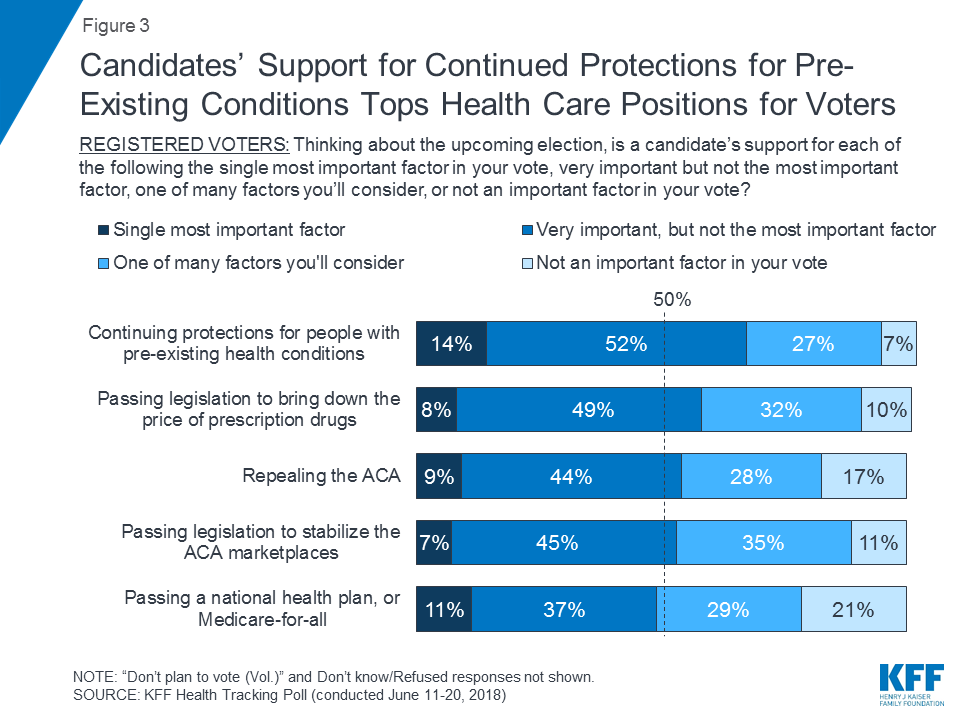
Partisans Differ on Top Health Care Positions for Candidates
Partisan voters have different views on how a candidate’s support for various health care positions will affect their vote choice. For Democratic voters, a candidate’s support for continued protections for people with pre-existing conditions is at the top of the list with eight in ten (81 percent) Democratic voters saying it is the most important or very important factor to their 2018 vote choice. This is followed by a candidate’s support for stabilizing the ACA marketplaces (69 percent), support for passing a national health plan, or Medicare-for-all (68 percent), and support for passing legislation to bring down the price of prescription drugs (66 percent). Fewer (57 percent) say a candidate’s support for repealing the ACA will be very or most important to their vote.
Among Republican voters, nearly six in ten say a candidate’s support for repealing the ACA is very or most important to their 2018 vote choice. Half say the same about a candidate’s support passing legislation to bring down the price of prescription drugs (52 percent) and support for continued protections for people with pre-existing conditions (51 percent). Across all other issues, less than half of Republican voters say it will be very or most important to their 2018 vote.
| Table 1: How Important Is A Candidate’s Support on Health Care Issues To Voters? | ||||
| Percent who say a candidate’s support for each of the following will be the… in their vote: | DemocraticVoters | IndependentVoters | RepublicanVoters | |
| Continuing protections for people with pre-existing conditions | Single most important factor | 18% | 15% | 8% |
| Very important, but not most important factor | 63 | 48 | 43 | |
| Passing legislation to bring down the price of prescription drugs | Single most important factor | 9 | 8 | 9 |
| Very important, but not most important factor | 57 | 44 | 43 | |
| Repealing the 2010 Affordable Care Act | Single most important factor | 10 | 9 | 9 |
| Very important, but not most important factor | 47 | 37 | 49 | |
| Passing legislation to stabilize the ACA marketplaces | Single most important factor | 11 | 7 | 2 |
| Very important, but not most important factor | 57 | 45 | 35 | |
| Passing a national health plan, or Medicare-for-all | Single most important factor | 17 | 9 | 7 |
| Very important, but not most important factor | 51 | 36 | 24 | |
Public Supports ACA Protections for Those With Pre-Existing Conditions
President Trump’s administration announced earlier this month that it will no longer defend the ACA’s protections for people with pre-existing medical conditions. These provisions prohibit insurance companies from denying coverage based on a person’s medical history (known as guaranteed issue), and prohibit insurance companies from charging those with pre-existing conditions more for coverage (known as community rating). The Trump administration argues that both of these protections are unconstitutional and should be deemed invalid once the individual mandate penalty goes away starting January 1, 2019. The majority of the public – including majorities of Republicans, Democrats, and independents – say it is “very important” to them that the ACA’s provisions protecting those with pre-existing conditions remain law.
Three-fourths of the public (76 percent) say it is “very important” to them that the provision that prohibits health insurance companies from denying coverage because of a person’s medical history remains law. An additional fifteen percent say it is “somewhat important” this provision remains law. Similarly, seven in ten (72 percent) say it is “very important” that the provision that prohibits health insurance companies from charging sick people more remains law, while an additional one in five (17 percent) say it is “somewhat important.”
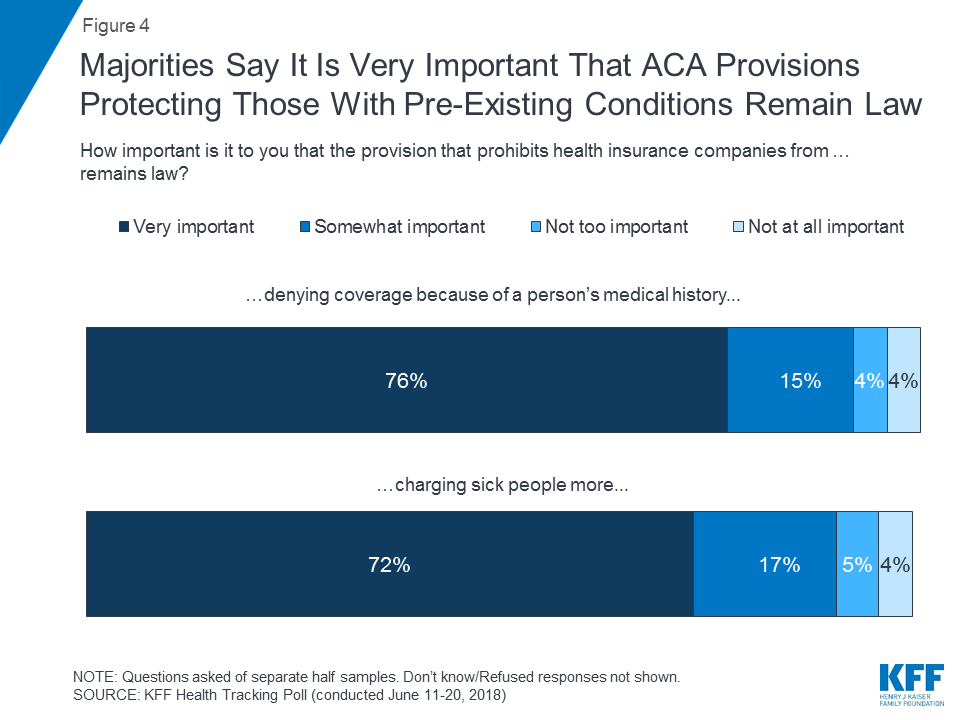
Majorities Across PArty Lines Support Protections for Those With Pre-eXisting Conditions
Majorities, across party identification and household health status, say it is “very important” that these protections remain law. Nine in ten Democrats (88 percent), 77 percent of independents, and 58 percent of Republicans say it is “very important” that insurance companies cannot deny coverage because of a person’s medical history. Similarly, a majority (85 percent of Democrats, 70 percent of independents, and 58 percent of Republicans) – say it is “very important” that health insurance companies cannot charge sick people more. Even among those living in households without anyone with pre-existing conditions – therefore, unlikely to be affected negatively by this change in policy – a majority say it is “very important” these protections remain.
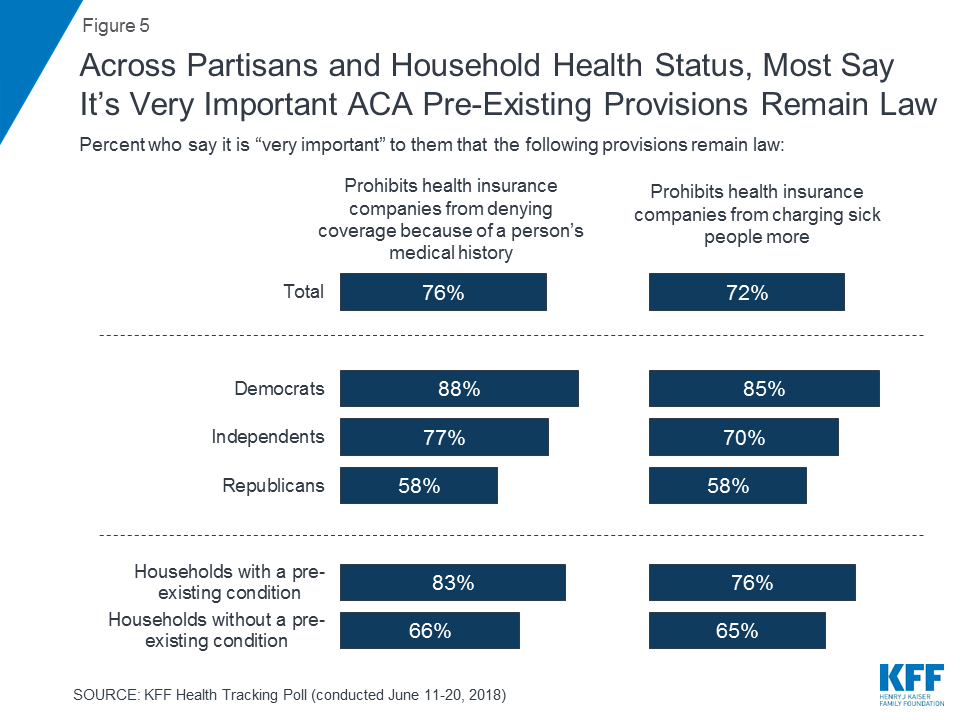
This most recent poll finding is similar to previous KFF polling on this issue. Public support for protections for individuals with pre-existing conditions had broad support prior to the passage of the 2010 health care law. A February 2010 Kaiser Health Tracking Poll found three-fourths (76 percent) of the public saying it is either “extremely important” or “very important” that reforming health insurance so that insurance companies can’t deny coverage based on pre-existing conditions is passed into law. Immediately after the election of President Trump, KFF polling found there was still majority support for the requirement that health insurance companies have to cover everyone regardless of medical history, with majorities of Democrats (75 percent), independents (65 percent), and Republicans (63 percent) saying they had a favorable opinion of this ACA provision.
Nearly Six in Ten Say They or Someone in Their Household Has a Pre-Existing Health Condition
Nearly six in ten (57 percent) say they or someone in their household suffers from pre-existing medical conditions such asthma, diabetes, or high blood pressure. Women (61 percent) are more likely to report someone in their household with a pre-existing condition than men (53 percent), as are older individuals (67 percent of those age 65 or older) compared to half (49 percent) of adults 18 to 29 years old.
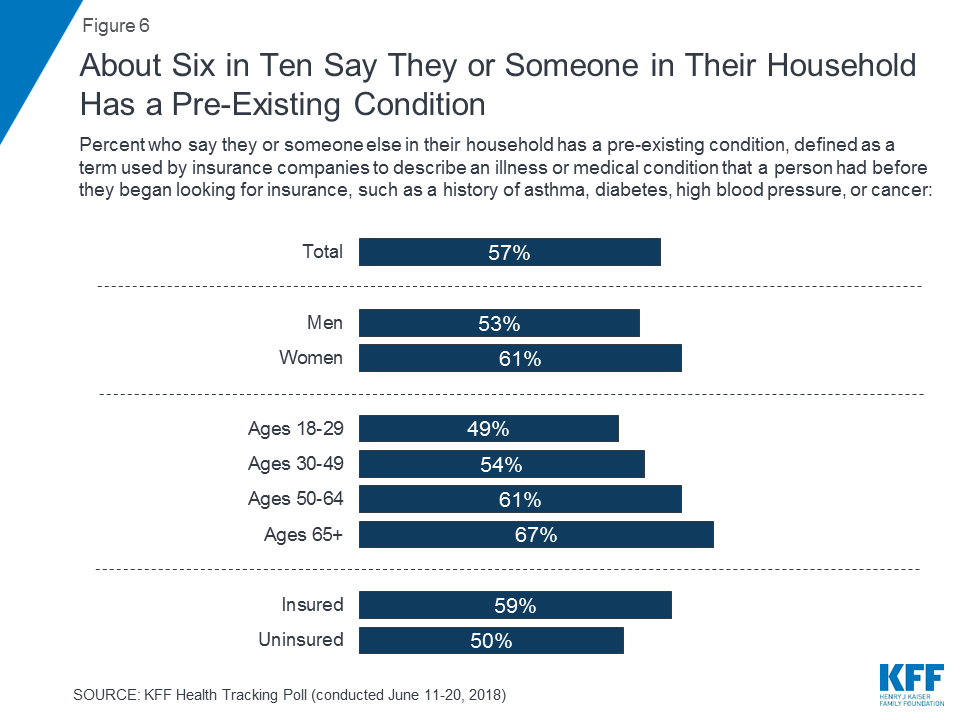
Broad Support for Requiring Prices in Prescription Drug Advertisements
POLL: Should drug ads be required to include price information as the Trump Administration has proposed? Three-quarters of the public say yes – including majorities of Democrats, Republicans and independents
On May 11, 2018, President Trump announced his plan titled, “American Patients First,” an effort aimed at lowering the price of prescription drugs. One key element of this plan is to require drug manufacturers to publish list prices for their prescription drugs in television advertisements. Three-fourths (76 percent) of the public favor the federal government requiring prescription drug advertisements to include a statement about how much the drug costs. In a rare instance of bipartisanship, this policy proposal is supported by a majority of Democrats (83 percent), independents (73 percent) and Republicans (72 percent).
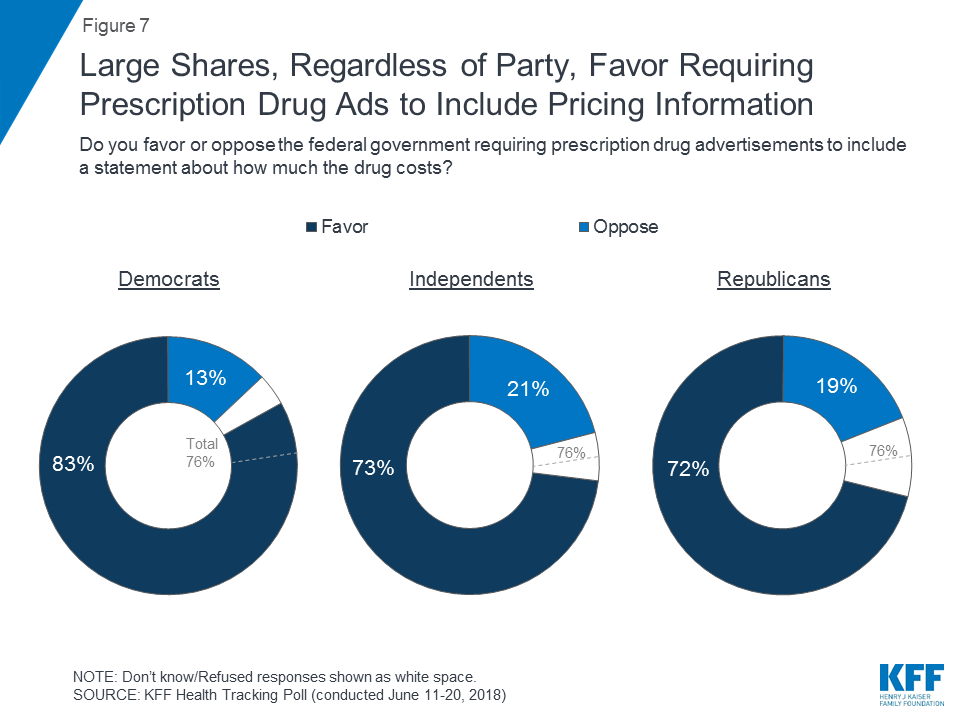
Prevalence of Prescription Drug Advertisements
Seven in ten (72 percent) say they have ever seen or heard any advertisements for prescription drugs, which is similar to the share who say they saw or heard such an advertisement in the past 12 months (69 percent).
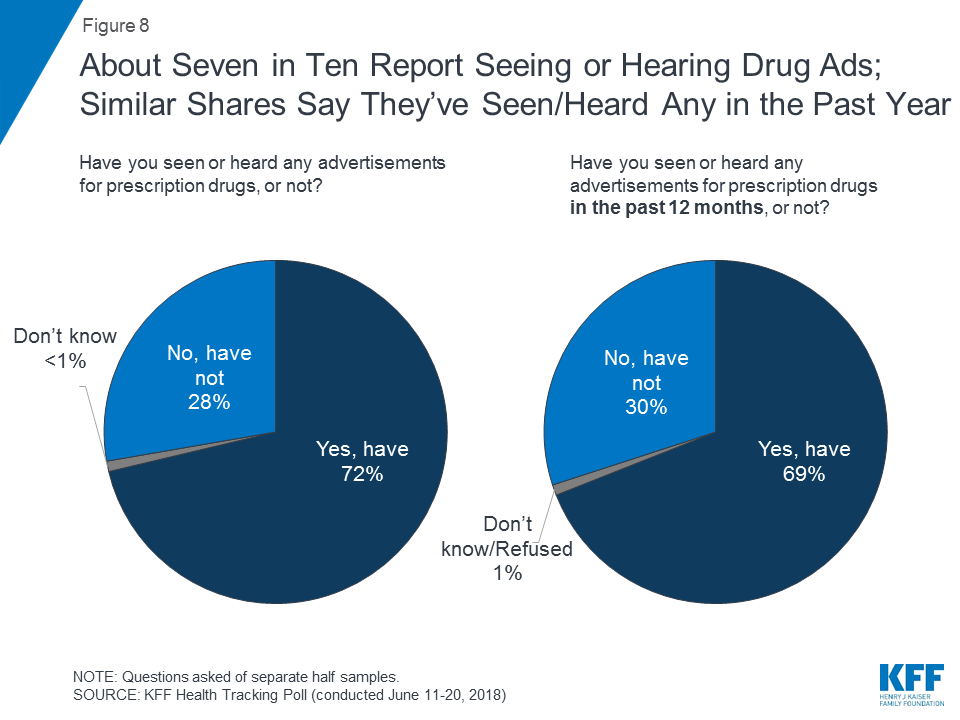
One in seven say they have talked to their doctor as a result of seeing an advertisement for a prescription drug while more than half (56 percent) say they have seen or heard advertisements for prescription drugs but have never spoken to their doctor about these ads.
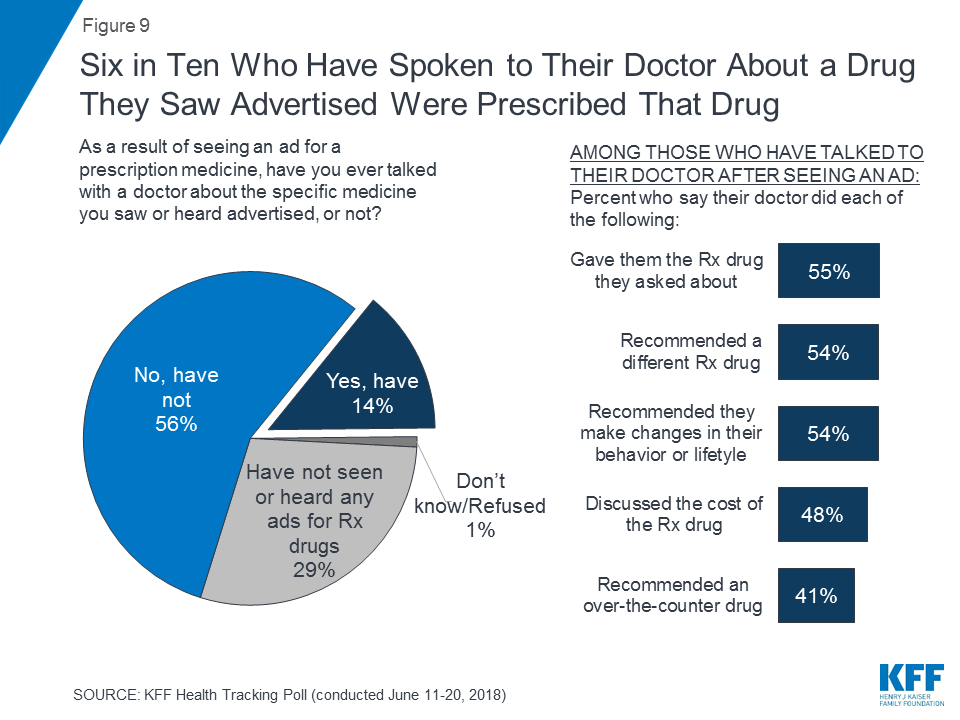
Among those who have spoken to their doctor about a specific medicine they saw advertised, nearly six in ten (55 percent) say the doctor gave them the drug they asked about, their doctor recommended a different prescription drug (54 percent), or their doctor recommended that they make changes in their behavior or lifestyle (54 percent). Half (48 percent) say their doctor discussed the cost of the drug while four in ten (41 percent) say their doctor recommended an over-the-counter drug instead.
Public’s Views of the Affordable Care Act
Half of the public continue to hold favorable views of the 2010 health care law, known as the Affordable Care Act. This continues the more than a year-long trend of a larger share of the public viewing the law favorably (50 percent) than unfavorably (41 percent).
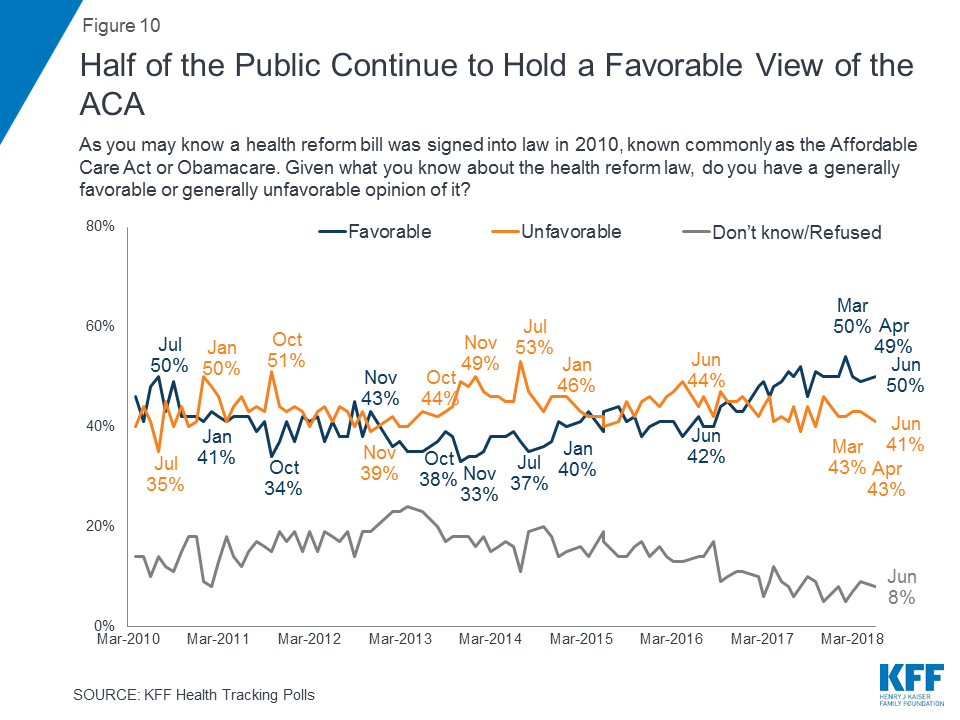
POLL: More voters say a candidate’s stance on protecting pre-existing conditions is important to their vote than say the same about drug prices, ACA repeal and other health care issues
Methodology
This Kaiser Health Tracking Poll was designed and analyzed by public opinion researchers at the Kaiser Family Foundation (KFF). The survey was conducted June 11th–20th 2018, among a nationally representative random digit dial telephone sample of 1,492 adults ages 18 and older, living in the United States, including Alaska and Hawaii (note: persons without a telephone could not be included in the random selection process). Computer-assisted telephone interviews conducted by landline (319) and cell phone (1,173, including 793 who had no landline telephone) were carried out in English and Spanish by SSRS of Glen Mills, PA. To efficiently obtain a sample of lower-income and non-White respondents, the sample also included an oversample of prepaid (pay-as-you-go) telephone numbers (25% of the cell phone sample consisted of prepaid numbers) as well as a subsample of respondents who had previously completed Spanish language interviews on the SSRS Omnibus poll (n=10). Both the random digit dial landline and cell phone samples were provided by Marketing Systems Group (MSG). For the landline sample, respondents were selected by asking for the youngest adult male or female currently at home based on a random rotation. If no one of that gender was available, interviewers asked to speak with the youngest adult of the opposite gender. For the cell phone sample, interviews were conducted with the adult who answered the phone. KFF paid for all costs associated with the survey.
This month’s poll also includes an analysis of young women under the age of 45 (n=402). To obtain a large enough sample, the sampling frame included an oversample of women using cell phones (n=59) as well as callbacks among women who fit the screening criteria using the SSRS Omnibus poll (n=182).
The combined landline and cell phone sample was weighted to balance the sample demographics to match estimates for the national population using data from the Census Bureau’s 2016 American Community Survey (ACS) on sex, age, education, race, Hispanic origin, and region along with data from the 2010 Census on population density. The sample was also weighted to match current patterns of telephone use using data from the July-December 2017 National Health Interview Survey. The weight takes into account the fact that respondents with both a landline and cell phone have a higher probability of selection in the combined sample and also adjusts for the household size for the landline sample, and design modifications, namely, the oversampling of prepaid cell phones and likelihood of non-response for the re-contacted sample. All statistical tests of significance account for the effect of weighting.
The margin of sampling error including the design effect for the full sample is plus or minus 3 percentage points. Numbers of respondents and margins of sampling error for key subgroups are shown in the table below. For results based on other subgroups, the margin of sampling error may be higher. Sample sizes and margins of sampling error for other subgroups are available by request. Note that sampling error is only one of many potential sources of error in this or any other public opinion poll. Kaiser Family Foundation public opinion and survey research is a charter member of the Transparency Initiative of the American Association for Public Opinion Research.
| Group | N (unweighted) | M.O.S.E. |
| Total | 1,492 | ±3 percentage points |
| Party Identification | ||
| Democrats | 495 | ±5 percentage points |
| Republicans | 376 | ±6 percentage points |
| Independents | 445 | ±5 percentage points |
| Voter registration | ||
| Registered voters | 1,177 | ±3 percentage points |
| Democratic voters | 411 | ±6 percentage points |
| Republican voters | 333 | ±6 percentage points |
| Independent voters | 329 | ±6 percentage points |
| Gender and Age | ||
| Men | 649 | ±4 percentage points |
| Women | 843 | ±4 percentage points |
| Women <45 years old | 402 | ±6 percentage points |
Endnotes
- This month’s tracking poll was in the field during a time when there was increased attention to the Trump Administration’s policy to separate immigrant families and the subsequent change in policy. ↩︎